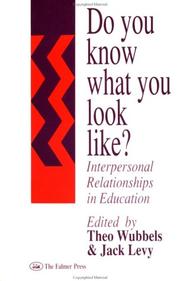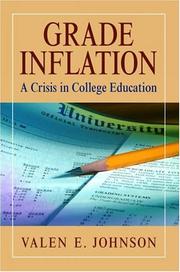| Listing 1 - 8 of 8 |
Sort by
|
Book
ISBN: 0900868414 Year: 1974 Publisher: London Society for research into higher education
Abstract | Keywords | Export | Availability | Bookmark
 Loading...
Loading...Choose an application
- Reference Manager
- EndNote
- RefWorks (Direct export to RefWorks)
Student evaluation of teachers. --- Teachers --- Rating of --- Student evaluation of teachers --- Student rating of teachers --- Evaluation --- Teacher-student relationships
Book
ISBN: 0669933287 Year: 1975 Publisher: Lexington Heath
Abstract | Keywords | Export | Availability | Bookmark
 Loading...
Loading...Choose an application
- Reference Manager
- EndNote
- RefWorks (Direct export to RefWorks)
College teachers --- Student evaluation of teachers --- Student rating of teachers --- Evaluation --- Teacher-student relationships --- Rating of. --- Student evaluation of teachers. --- Rating of
Book
ISBN: 0875894372 Year: 1982 Publisher: San Francisco, Calif.
Abstract | Keywords | Export | Availability | Bookmark
 Loading...
Loading...Choose an application
- Reference Manager
- EndNote
- RefWorks (Direct export to RefWorks)
College teachers --- Student evaluation of teachers --- #PEDA *8.136 --- #PEDA *8.111.3 --- #PEDA *8.13 --- #PEDA *8.146 --- #PEDA *8.147 --- Student rating of teachers --- Evaluation --- Teacher-student relationships --- Rating of. --- Higher education --- Student evaluation of teachers. --- Rating of
Book
ISBN: 1780632584 1843345730 9781780632582 9781843345732 Year: 2011 Publisher: Oxford [England] Chandos Publishing
Abstract | Keywords | Export | Availability | Bookmark
 Loading...
Loading...Choose an application
- Reference Manager
- EndNote
- RefWorks (Direct export to RefWorks)
In recent years, student feedback has appeared at the forefront of higher education quality. In particular, the issues of effectiveness and the use of student feedback to affect improvement in higher education teaching and learning, and also other areas of student tertiary experience. Despite this, there has been a relative lack of academic literature, especially in book format, focusing on the experiences of academics, higher education leaders and managers with expertise in this area. This comprehensive book addresses this gap.With contributions by experts in the area of higher educat
Education, Higher -- Evaluation. --- Student evaluation of curriculum. --- Student evaluation of teachers. --- Universities and colleges -- Evaluation. --- Education --- Social Sciences --- Theory & Practice of Education --- Education, Higher --- Universities and colleges --- Educational evaluation. --- Evaluation. --- Educational assessment --- Educational program evaluation --- Evaluation research in education --- Instructional systems analysis --- Program evaluation in education --- Self-evaluation in education --- Evaluation --- Student rating of teachers --- Teacher-student relationships --- Curricula
Book
ISBN: 9781138599888 9781138599895 9780429485480 Year: 2019 Publisher: London Routledge, Taylor & Francis Group
Abstract | Keywords | Export | Availability | Bookmark
 Loading...
Loading...Choose an application
- Reference Manager
- EndNote
- RefWorks (Direct export to RefWorks)
"Visible Learning: Feedback brings together two internationally known educators, combining Hattie's world famous research expertise with Clarke's vast experience of classroom practice and application. Areas covered include the variability of feedback, the importance of surface, deep and transfer contexts, student to teacher feedback, the power of peer feedback and the power of within-lesson feedback. Feedback is arguably the most critical and powerful aspect of teaching and learning and no other book currently available combines research excellence, theory and vast practical expertise in the same way, making this book an essential resource for teachers in any setting, phase or country"--
Student evaluation of teachers --- Student evaluation of curriculum --- Teacher-student relationships --- Feedback (Psychology) --- Reflective teaching --- Pupil-teacher relationships --- Student and teacher --- Student-teacher relationships --- Students and teachers --- Teacher and student --- Teacher-pupil relationships --- Teachers and students --- Interpersonal relations --- Education --- Evaluation --- Teaching --- Teachers --- Student rating of teachers --- Learning, Psychology of --- Reinforcement (Psychology) --- Curricula --- Self-rating of --- Visible learning --- Didactic evaluation

Abstract | Keywords | Export | Availability | Bookmark
 Loading...
Loading...Choose an application
- Reference Manager
- EndNote
- RefWorks (Direct export to RefWorks)
Interpersonal relations --- Student evaluation of teachers --- Teacher-student relationships --- Teachers --- #PEDA *1.3 --- Faculty (Education) --- Instructors --- School teachers --- Schoolteachers --- School employees --- Pupil-teacher relationships --- Student and teacher --- Student-teacher relationships --- Students and teachers --- Teacher and student --- Teacher-pupil relationships --- Teachers and students --- Student rating of teachers --- Evaluation --- Human relations --- Interpersonal relationships --- Personal relations --- Relations, Interpersonal --- Relationships, Interpersonal --- Social behavior --- Social psychology --- Object relations (Psychoanalysis) --- Attitudes. --- Sociology of education --- Teacher education. Teacher's profession --- Attitudes
Book
ISBN: 9462097763 9462097747 9462097755 Year: 2014 Publisher: Rotterdam, Netherlands : Sense Publishers,
Abstract | Keywords | Export | Availability | Bookmark
 Loading...
Loading...Choose an application
- Reference Manager
- EndNote
- RefWorks (Direct export to RefWorks)
The issue of teacher quality is increasingly seen as being central to education policy development and this emphasis highlights the role teacher professional development plays in improving teacher effectiveness and the quality of learning in the classroom. This book describes a large-scale research program which investigated the feasibility of using student perceptual measures as the basis for teacher development and classroom improvement. The book describes how teachers’ use of the student feedback, as part of an action-research process, was used to guide improvements to their respective classrooms which in turn provided them with increased opportunities for teacher development and growth. In addition to this, it reports the efforts of one school which purposefully linked the involvement of their teachers to their school improvement initiatives. This book would be of interest to a range of audiences including researchers, teachers and school leaders. Its attractions include its far-reaching implications for educational systems concerning the ways in which student feedback can be used to facilitate teacher development and growth. The book also reports the use of a multi-method research design in which quantitative and qualitative methods were successfully employed simultaneously within two concurrent and interrelated investigations.
Action research in education. --- School improvement programs. --- Improvement programs, School --- Instructional improvement programs --- Programs, School improvement --- School self-improvement programs --- School management and organization --- Education --- Research --- Education. --- Education, general. --- Children --- Education, Primitive --- Education of children --- Human resource development --- Instruction --- Pedagogy --- Schooling --- Students --- Youth --- Civilization --- Learning and scholarship --- Mental discipline --- Schools --- Teaching --- Training --- Education, Secondary. --- Effective teaching. --- Student evaluation of teachers. --- Instructional effectiveness --- Teaching effectiveness --- Teaching quality --- Teacher effectiveness --- High school education --- High school students --- Secondary education --- Secondary schools --- Teenagers --- High schools --- Student rating of teachers --- Evaluation --- Teacher-student relationships --- Education (Secondary)

ISBN: 1280006765 9786610006762 0387215921 0387001255 Year: 2003 Publisher: New York, N.Y. Springer
Abstract | Keywords | Export | Availability | Bookmark
 Loading...
Loading...Choose an application
- Reference Manager
- EndNote
- RefWorks (Direct export to RefWorks)
Grade inflation runs rampant at most colleges and universities, but faculty and administrators are seemingly unwilling to face the problem. This book explains why, exposing many of the misconceptions surrounding college grading. Based on historical research and the results of a yearlong, on-line course evaluation experiment conducted at Duke University during the 1998-1999 academic year, the effects of student grading on various educational processes, and their subsequent impact on student and faculty behavior, is examined. Principal conclusions of this investigation are that instructors' grading practices have a significant influence on end-of-course teaching evaluations, and that student expectations of grading practices play an important role in the courses that students decide to take. The latter effect has a serious impact on course enrollments in the natural sciences and mathematics, while the combination of both mean that faculty have an incentive to award high grades, and students have an incentive to choose courses with faculty who do. Grade inflation is the natural consequence of this incentive system. Material contained in this book is essential reading for anyone involved in efforts to reform our postsecondary educational system, or for those who simply wish to survive and prosper in it. Valen Johnson is a Professor of Biostatistics at the University of Michigan. Prior to accepting an appointment in Ann Arbor, he was a Professor of Statistics and Decision Sciences at Duke University, where data for this book was collected. He is a Fellow of the American Statistical Association.
College students --- Grading and marking (Students) --- Student evaluation of teachers --- Rating of --- Higher education --- Education. --- Science. --- International education. --- Comparative education. --- Statistics. --- International and Comparative Education. --- Statistics, general. --- Science, general. --- Statistics for Social Science, Behavorial Science, Education, Public Policy, and Law. --- Statistics for Social Science, Behavioral Science, Education, Public Policy, and Law. --- Science, Humanities and Social Sciences, multidisciplinary. --- Statistics for Social Sciences, Humanities, Law. --- #PBIB:2004.3 --- Student rating of teachers --- Evaluation --- Teacher-student relationships --- College life --- Universities and colleges --- University students --- Students --- Education --- International education . --- Statistics . --- Statistical analysis --- Statistical data --- Statistical methods --- Statistical science --- Mathematics --- Econometrics --- Education, Comparative --- Global education --- Intellectual cooperation --- Internationalism --- History
| Listing 1 - 8 of 8 |
Sort by
|

 Search
Search Feedback
Feedback About UniCat
About UniCat  Help
Help News
News